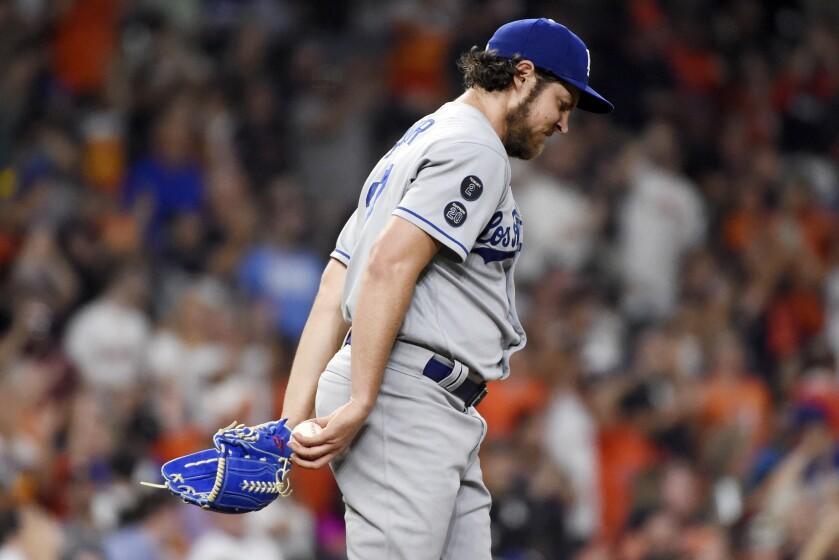
Trevor Bauer has made 17 starts for the Dodgers, and he probably won’t make any more after he was suspended on Friday for two seasons for violating baseball’s sexual assault and domestic violence policy.
In which case, the Dodgers will have paid him a total of $41.5 million.
Or about $2.4 million a start.
That’s more than double the rate the New York Yankees paid for each of the 30 games Gerrit Cole pitched last season.
How’s that for irony?
When Bauer’s three-year agreement was finalized in February of last year, the Dodgers viewed the contract as a steal.
The contract’s unconventional structure incentivized Bauer to opt out of the final season. The Dodgers believed they were paying $85 million for about 60 regular-season starts by Bauer at his prime of his career — plus whatever he did in the postseason.
Instead, the deal ended up as one of the worst in the history of a franchise that has made some embarrassing investments, from the $47 million for Jason Schmidt to the $48 million for Scott Kazmir.
The Dodgers outsmarted themselves.
Being unorthodox has been one of their trademarks under the leadership of Andrew Friedman, the Dodgers sparing no expense in their search for every possible edge.
Their analytics-driven approach has made them baseball’s most consistent franchise. But the Moneyball mentality is what drove them to court Bauer.
The Dodgers didn’t know Bauer would be accused of sexual assault. However, they knew he was always in some sort of trouble.
They knew how respected baseball people such as Kevin Towers and Terry Francona wanted nothing to do with him. They knew he sliced open his pitching hand repairing a drone.
They knew he threw a ball over the centerfield wall instead of handing it to the manager when he was taken out of a game. They knew of his online harassment campaign against a female college student.
They also knew of how he defended Donald Trump, spread an antisemitic conspiracy theory, mocked transgender people and defended the Cleveland Indians’ logo. His views are common in the major leagues, where many players identify as conservatives. What’s uncommon is how he uses social media to attract the attention he craves.
While none of this was illegal, what Bauer represented was the opposite of what the Dodgers claim to be. The Dodgers champion themselves as more than a sport team.
They are the franchise of Jackie Robinson. They are the team that opened the doors of the major leagues to Mexico and Japan, the Dominican Republic and South Korea. How could they sign John Q. MAGA to be their next star?
The question was never about whether Bauer would get into trouble; the question was about what kind of trouble he would get into.
The Dodgers were enamored by the idea of landing a player of Bauer’s quality without having to pay him into his late 30s, so much so that they ignored his problematic history.
There were immediate signs of trouble. In his introductory videoconference, Bauer declined to speak about his online treatment of women. The most charitable interpretation at the time was that he felt he was being bullied into an apology; as someone who was bullied throughout his childhood, he resisted. Even then, wasn’t that evidence of a damage psyche?
Presumably, the Dodgers also believed their clubhouse culture would have a positive effect on Bauer. However, as much as they talked about the importance they placed on character and chemistry, they ultimately remained a
sabermetrics-driven team and their players recognized this.
The Dodgers are the team that traded Clayton Kershaw’s close friend, A.J. Ellis. They are the team that has kept their pitchers from attempting to finish no-hitters and perfect games on the account of their pitch counts.
They are the team that insisted on using a reliever as an opener in a critical postseason game against the San Francisco Giants last year — even as manager Dave Roberts acknowledged 20-game winner Julio Urias deserved to start the game. The ruthlessness of the Dodgers has been masked by their willingness to spend.
They could afford players such as Kershaw, Mookie Betts and Freddie Freeman, who don’t make them have to choose between character and ability. They could afford to trade a knucklehead such as Yasiel Puig and spend $55 million to replace him with a likable player such as A.J. Pollock.
In the case of Bauer, the underlying philosophy responsible for the team’s success surfaced. This time, they paid, in reputation and in money.
This story originally appeared in Los Angeles Times.
